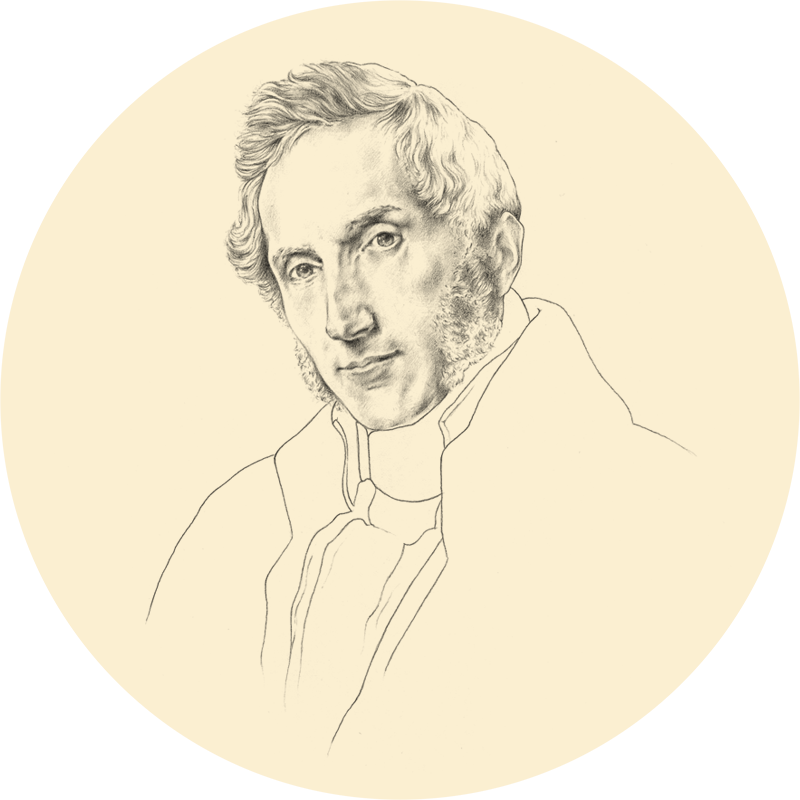Perhaps Milan was truly yours, Alessandro, on those evenings at home, in the house on Via Morone, when the children played blind man’s bluff in the big red room and Henriette – more the older sister, in a way, than the mother of your children – played the piano. There was Luigi Rossari, your companion on long daily walks through the streets of the city; there was Giulia, your mother, daughter of that Cesare Beccaria who taught Europe the principles of criminal justice; there was Giovanni Torti, “prince of Java,” a lazy poet, whom you had chosen as a tutor for your daughters Cristina and Sofia. There was Tommaso Grossi, a close friend who lived next door to your study on the ground floor of your house, in the “island of Java,” the paradise of idlers, of the “giavan”; you were so fond of him that during your journeys to Paris you wrote him affectionate letters, telling of your desire to return to the “little downstairs room” next to his. To sit in your worn but dignified armchair and listen to the verses of The Lombards on the First Crusade, the poem he was writing in those years, or to converse in your rounded, witty Milanese dialect, one elbow on the mantelpiece, fishing for a pinch of spicy tobacco from the cylindrical jar, the one Francesco Hayez put in your hand in the portrait he painted of you, many years later.
You were born in Milan, Alessandro, on Via San Damiano, the putative son of Pietro, a nobleman from Lecco, too old for the balky Giulia, in her twenties, brimming with life, averse to the marriage of appearances urged by the Verri family as a shield against the excesses of Giovanni, the youngest of the brothers. You remember nothing of that rented house. Your mother sent you to a nanny at Caleotto, the district that was the land of your childhood, and then – when you were barely seven – she vanished, after separating from Pietro; first London, then finally to Paris, in the home of Carlo Imbonati. In those tender years you went from boarding school to boarding school: from Merate, closed up in a room to write verses, to Lugano, far from the political troubles; from Magenta, where you met Vincenzo Monti, to Milan, where Francesco Lomonaco published, in his Lives of Excellent Italians, your sonnet For the “Life of Dante.” You were seventeen years old, and as you wrote in your Self-portrait you had brown hair, a high forehead, talkative eyes. And the desire to flee from the gloomy home of your father, surrounded by spinster aunts and a monsignor uncle with a wen on his eye.
Life gives: the mother who didn’t see your childhood was the joy of your twentieth year. In Paris, your restless and anticlerical poet’s soul completed its upbringing thanks to Claude Fauriel and all the cultural circles you frequented with Giulia. Life takes away: Pietro died two years later, in 1807, leaving you as his universal heir. Maybe he gave you his name not only to put a stop to wagging tongues. Maybe, in his way, he was fond of you.
It was Giulia who introduced you to Henriette, daughter of a French Calvinist mother and a Swiss agnostic. The Blondels lived in the Porta Nuova district, on Via del Marino, at Palazzo Imbonati, demolished during your lifetime to make room for a theater, Alessandro, which was also lost after the bombings of the war. On that square today stands a bronze monument by Francesco Barzaghi, with which Milan honored you ten years after your death, right in front of San Fedele, your family parish for years, where Enrico took first communion, where you liked to pray, to the left of the altar. Where you stumbled on the steps of the churchyard, in your eighties, causing an injury that led to your passing.
You were married at Palazzo Imbonati, with a Calvinist ceremony. You never wanted to speak of your conversion, in Paris, in the church of Saint Roch, convinced you had lost your beloved Henriette – blonde, meek, gracious, the exact opposite of your mother – in the rejoicing throng. “It was God’s grace,” you confided many years later to Stefano Stampa, the son of your second wife.
